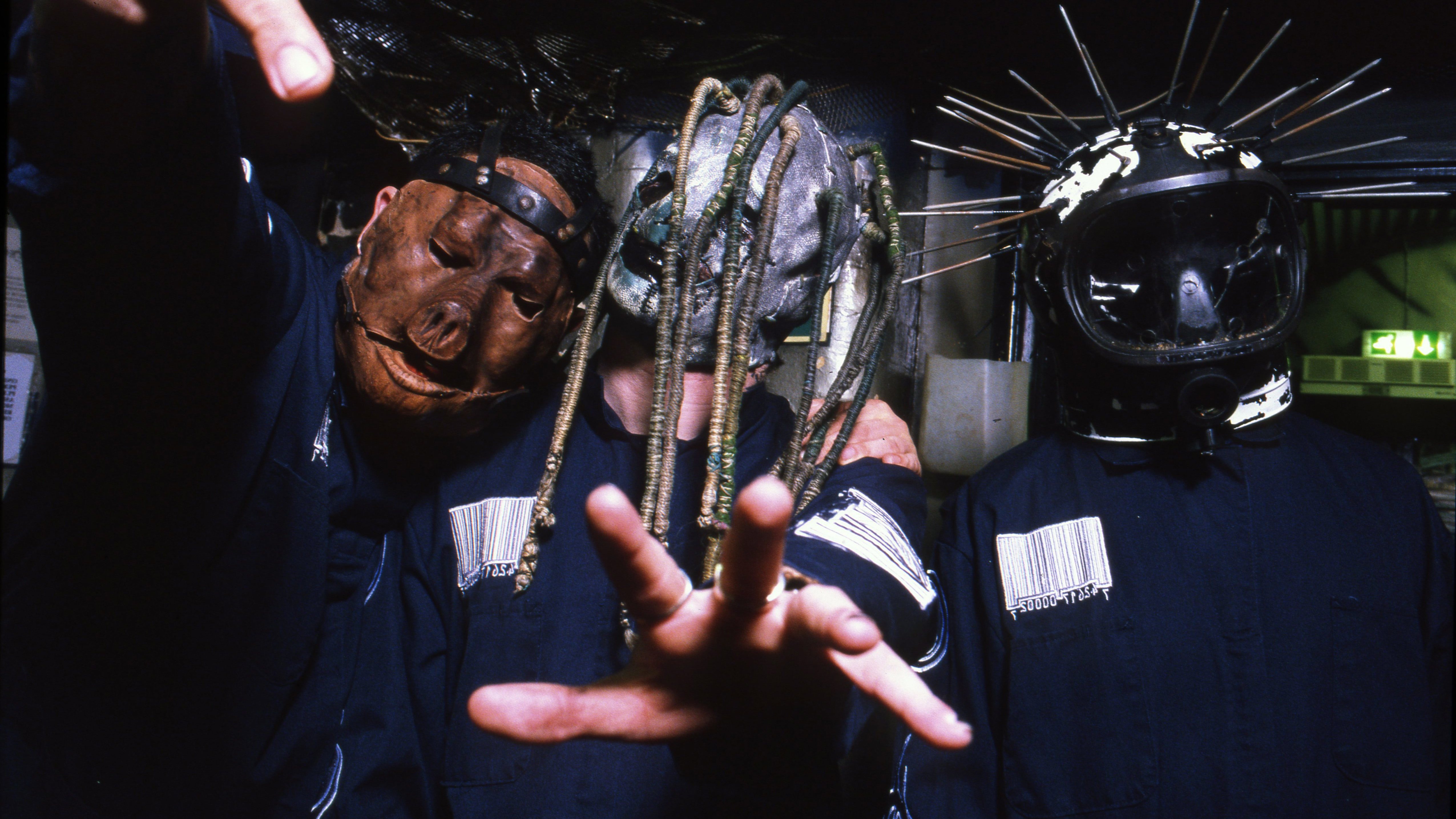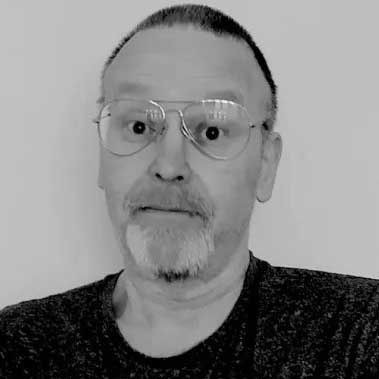“If truth be told it was really my wife who persuaded me to sign Slipknot,” Roadrunner Records supremo Monte Conner tells Hammer. “I really wasn’t sure. I liked them but I was prevaricating. That and a character that they had in the band at that time – called, I think, The Baby [aka the mentalist Cuddles – Ed] – swung me.”
Welcome to the mid 90s, a period that seems almost as remote as the Dark Ages in terms of the phenomenal changes that we have seen in heavy music and in the lives of nine [or so] crazy kids from the Mid-Western USA who had an idealistic dream to scare the living piss out of the whole motherfucking planet.
“Slipknot is still the heaviest album ever to make it onto the Billboard Top 3,” says Corey Taylor. “There’s no doubt that the album opened the door to a lot more very extreme bands crossing into the mainstream,” says Monte Connor.
“It set the bar,” agrees Joey Jordison.
In retrospect, Slipknot’s 1999 self-titled album was a major change in metal. Until then, bands were still caught up in the fallout from grunge, and while the lightweight pop-metal of bands such as Korn, Limp Bizkit and others were keeping hard rock alive and on permanent rotation on MTV, there was nothing outside of the underground to challenge the old guard of Slayer, Metallica and Megadeth, nothing with any real substance.
Slipknot had no idea what they were going to sound like when they formed: stuck in dead-end bands and dead-end day jobs, they wanted to do something – anything – to get the fuck right out of that life. “Back at the time, there was no metal going on in Des Moines, there was no hardcore, nothing. We had all been in bands that had opened up for each other, and the scene had become just terrible. No one really gave a fuck about music, so we formed Slipknot,” says Corey Taylor.
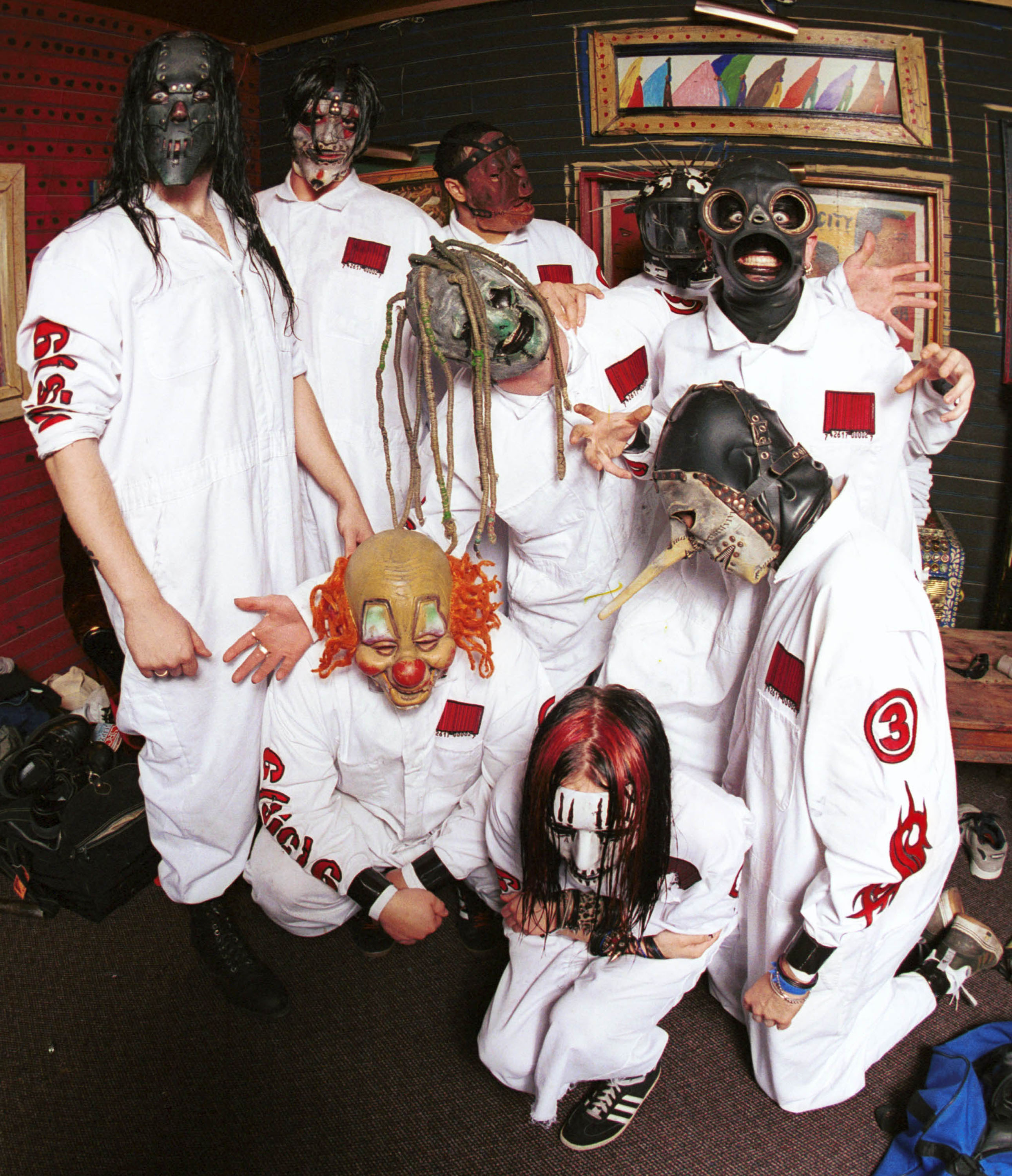
Shawn Crahan used to frequent a club in Des Moines called The Runway where cover bands and tribute bands would try to outshine each other in their slavish imitation of other bands. When the only two original metal bands in Des Moines that he liked broke up, he knew it was time for him to do it himself. Along with vocalist Anders Colsefni and Paul Gray, he formed a band called Meld. Local drummer Joey Jordison was persuaded to come and watch them rehearse: one song they played that night was called Slipknot. He knew there and then that he had to be in.
Joey Jordison worked as a night manager at a gas station. He’d leave band practice at 10pm, take a radio and TV to the gas station and crank metal out all night. Shawn Crahan would come down and they’d start plotting things out. When he left at 5am, they had worked out the blueprint for the band that Slipknot would eventually become. Then he got fired because he was scaring the customers away. “We literally had people pull up, see me and Shawn sitting in the window, floor it out of there and go to the Amoco station across the street.”
Slipknot’s live shows around the period between 1995 and 1998 were occasionally shambolic affairs, played out in bars in the bad part of town to at best indifferent and at worst hostile crowds. Line-ups changed: original guitarists Donnie Steele and Josh Brainard left, the former after he “found Christ”, the latter lost interest. Anders Colsefni left in 1997 and was replaced by Corey Taylor who the band had met when they faced off against Stone Sour in a Battle Of The Bands contest. Craig Jones was tapped to replace Donnie, but he was moved to samples and Mick Thomson joined as lead guitarist. When Josh bolted, Corey suggested a replacement, James Root, from his old band Stone Sour. The band found DJ Sid Wilson later on, and the incarnation of Slipknot that we all love to hate was formed.
There were a few labels interested in Slipknot, particularly in the wake of their debut release Mate. Feed. Kill. Repeat, essentially a collection of demo-quality tracks that gives us a snapshot of a band not quite fully formed.
“There were a few tracks on that record that were good that ended up being redone on the first Roadrunner album,” says Monte Connor.
As well as Roadrunner’s Monte Connor, producer Ross Robinson – then riding high on the success of his work with Korn and Limp Bizkit – had heard the album and went to Des Moines to see the band himself, intending to sign them to his IAM imprint. After seeing them and hanging out with them in strip bars – “Des Moines’ main form of entertainment,” says Corey Taylor a tad wearily – Robinson was impressed by their dedication and by their vision. It was the alchemical reaction that would turn base metal to gold.
Thanks in part to Robinson and Monte Connor’s wife, Slipknot were signed and travelled out to Robinson’s Indigo Ranch studio in California to start work on the album. For a time, Robinson seemed to be the only person who was totally convinced by Slipknot. As far as the band were concerned, they’d written the album for themselves and had no idea that anyone else outside of their friends and family would buy it.
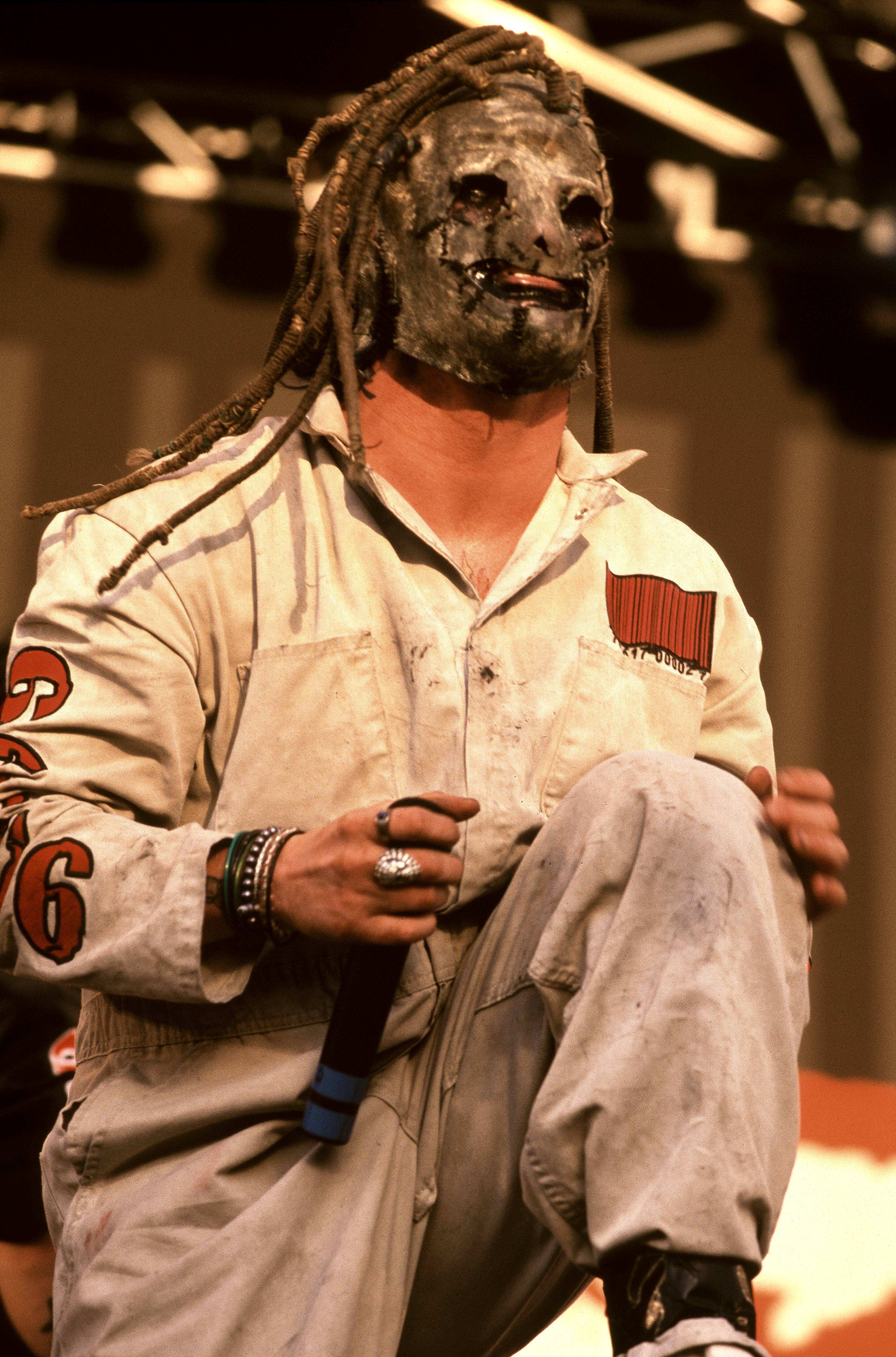
“We hadn’t recorded the album yet; we hadn’t gone out and toured; we didn’t know how people were going to take us. So we’d just written the songs for us. There was no audience until then,” says Corey.
The band travelled economy class in those days and slept where they fell, on couches and on armchairs if they were lucky, on hard floors if not. Robinson has a reputation as a producer who lays down challenges to bands to get the best work out of them; with Slipknot it was a two-way street.
“I was working out every day just to stay on top of that record,” Robinson, a man who seems to hyperventilate with enthusiasm in everyday conversations, told Hammer. “It was spontaneous, it was violent. Things were getting broken. We were out there away from anyone else, nobody dropping by or hanging out, it got crazy really quickly.”
“Ross had me pounding that kit so hard that my hands were bleeding, and that was when we were just setting up the drum levels. My hands were covered in these bloody bandages,” says Joey.
“Ross pushed us and we pushed back,” says Corey. “It was a fight. Ross was throwing punches at us. He was so into it. You can hear that on the record.”
“It’s a piece of magic,” says Robinson. “We made it for us.”
It was a brutal, desensitised catalogue of rage and despair. It was like a fusion of the most extreme hip-hop with the most extreme metal. In the raw blast of Eyeless Corey Taylor screams: ‘Insane – Am I the only muthafucker with a brain?/I’m hearing voices but all they do is complain/How many times have you wanted to kill/ Everything and everyone – Say you’ll do it but never will/You can’t see California without Marlon Brando’s eyes/I am my Father’s son/He’s a phantom, a mystery and that leaves me/ Nothing!/How many times have you wanted to die?/It’s too late for me/All you have to do is get rid of me!’
The song was inspired by the schizophrenic ravings of a street dweller that the band met in New York when they were visiting the offices of Roadrunner Records to sign their contract.
According to Mick Thomson: “He was running around, screaming it at everyone. Though I think his choice of actor was pretty cool. He was off his shit.”
In the more defiant Surfacing Corey sings: ‘Fuck it all/Fuck this world/Fuck everything that you stand for/Don’t belong/Don’t exist/ Don’t give a shit/Don’t ever judge me.’
But the truly terrifying Scissors, an unconnected, rambling stream of consciousness evocative of a deranged killer, was the album’s ‘money shot’, the equivalent of Linda Blair’s 360 degree head-spin in The Exorcist or the chest-burster in Alien: ‘I play doctor for five minutes flat/Before I cut my heart open and let the air out/Three bugs, a pound of dust/Some wind spilled before me In the strangest manner that had/Broke away my tear spout’.
It may have sounded like horror comic stuff to some critics, but there was a basis in the very real human pain that some of the band’s members had suffered. Rumours of child abuse, suicide attempts and a mania for self-slashing added to the band’s mystique.
In an interview with Metal Hammer at the time, Joey Jordison said: “You stick nine guys together who have had no outlet for their whole lives, and you live in Iowa and you come out on a fucking stage, then you have some shit to portray. We were walking around like ghosts, slitting our wrists open saying, ‘Please take a look at this, look at what we are trying to do’. When we put it together and came to doing a live show all the elements of being downgraded, not appreciated, being given nothing because we live in such a shithole, all that came out. There is no way you can go through life thinking everything is great because it’s not. Look at all the fucked-up shit that goes on. The world is a sick fucking place. The fact is you can come to our show and get all your aggressions out and go away feeling relieved. I want everyone to get a rush of emotion from it.”
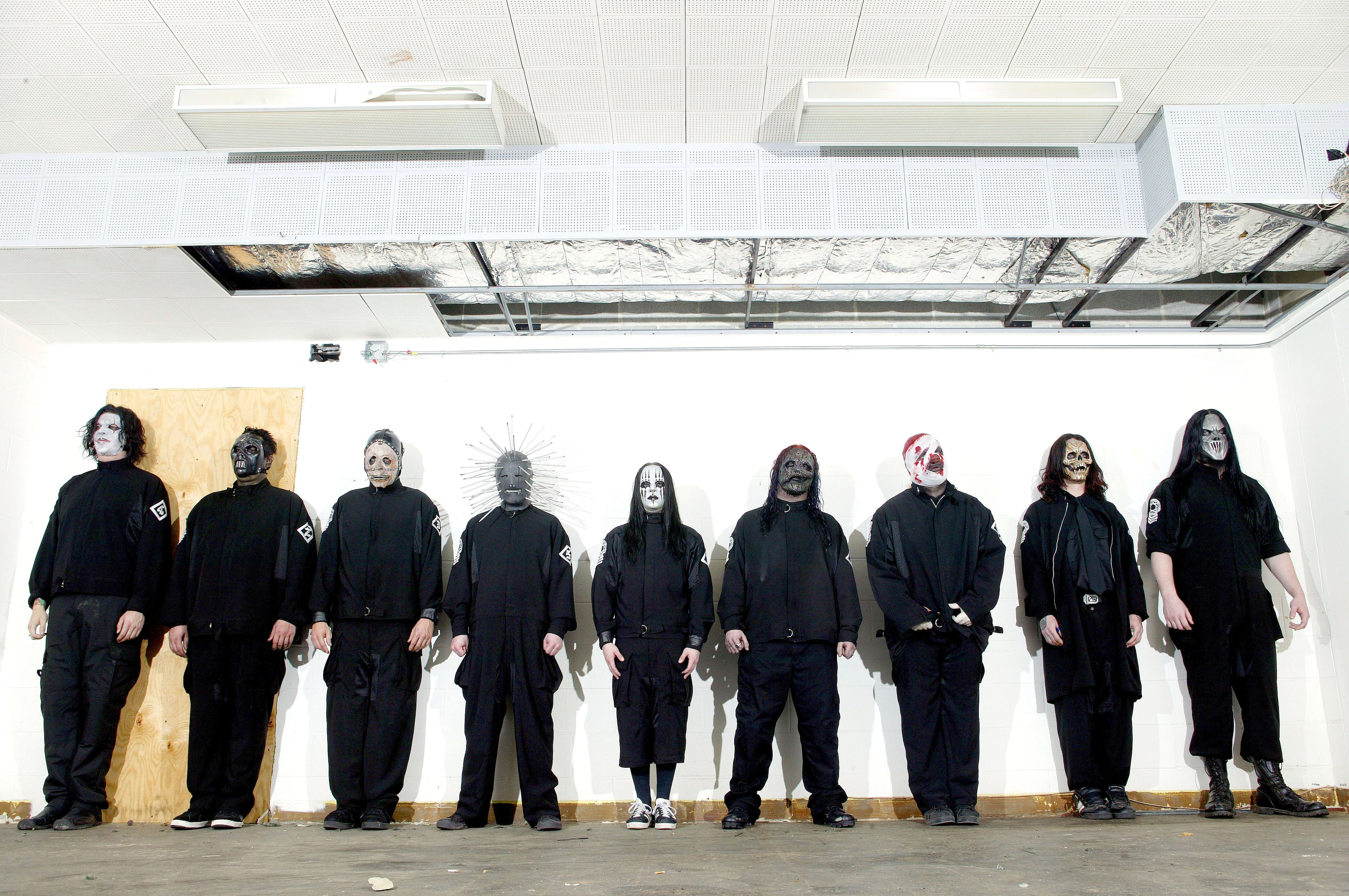
The band’s self-titled debut album was the most successful record Roadrunner ever had, with only Coal Chamber coming close. The rapid success of the album owed a lot to the rather shrewd decision to buy Slipknot onto the opening slot of the 1999 Ozzfest tour. The band struck up a good relationship with Jack Osbourne, who had a hand in booking subsequent tours. Without the benefit of support from press, radio or MTV, the album became a cult item that went platinum within three months of release. This allowed them to obviously shock the shit out of the mainstream; the music and the image guaranteed fodder for the ban-it brigade in the wake of the Columbine shootings. But the first people to turn their noses up were not concerned Conservative Christians, it was the metal underground, who wrote them off as another addition to the nu-metal canon.
Joey: “If you listen to a song like Get This, or Surfacing or [sic] or even like fucking Scissors, the roots are death metal, thrash, speed metal, and I could go on and on about all those bands. I know all the songs, and I know every fucking label… the underground metal kids should also be happy because the current success of Slipknot, on songs like Surfacing and [sic] that have super-fast 16th-note double-bass – none of those fuckers in the other bands they lump us with could contend with that.”
This article originally appeared in Metal Hammer Presents… Slipknot And The Story Of Shock Rock.
For more on Slipknot’s formative years, then click on the link below.
Slipknot: "I would drink from the moment I woke up, until I passed out"
